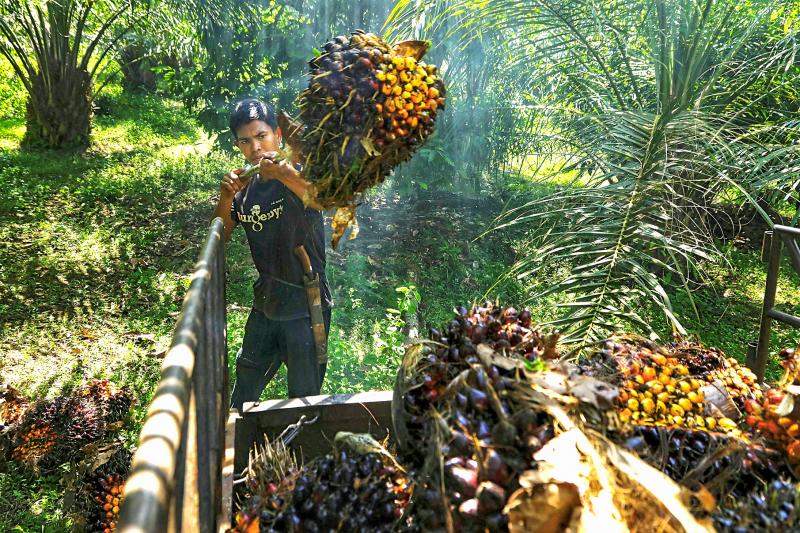Almost one-fifth of the land used for Indonesian palm oil plantations is located in the country’s forest conservation areas, despite a law banning such activity, a study by Greenpeace has found.
The report, produced by Greenpeace and TheTreeMap, describes a catastrophic failure of law enforcement that has permitted swathes of land — including UNESCO sites, national parks and areas mapped as habitats for orangutans and Sumatran tigers — to be cultivated as palm oil plantations.
Indonesia is the world’s biggest producer of palm oil, which is used in many everyday products and foods, from shampoo and lipstick to chocolate and frozen pizzas.

Photo: AFP
However, demand for palm oil is driving the destruction of carbon-rich forests that are home to Aboriginal communities and crucial to biodiversity.
Of the estimated 16.38 million hectares of palm oil plantations across Indonesia, 19 percent are found inside forest conservation areas.
The analysis, produced using maps of industrial palm oil plantation concessions and satellite imagery, found that by the end of 2019, there were 3.12 million hectares of palm oil operations across forest conservation areas.
Half of the operations (1.55 million hectares) were industrial palm oil plantations.
At least 600 plantation companies had operations set up inside forest conservation areas, the study found.
As of the end of 2019, plantings to produce palm oil in Indonesia’s forest conservation areas occupied 183,687 hectares of land previously considered orangutan habitats and 148,839 hectares of Sumatran tiger habitats.
Greenpeace Indonesian Forests Campaign head Kiki Taufik said that instead of punishing companies, the government had offered increasingly lenient amnesties for such operations.
“It’s supposed to be that [companies] are sanctioned, but now they have got the red carpet out to process the illegal [activities],” Taufik said.
It is not clear what proportion of the identified plantations have subsequently been legalized.
Policy is pushing Aboriginal and rural communities toward an apocalyptic future, he said.
“In areas where extensive forest clearance has been condoned, these landscapes are now subject to life-threatening heat waves, frequent flooding and, during the dry season, moist forest cover is now prone to annual fires,” Taufik added.
Few companies have been prosecuted for illegal developments, and those that have been punished are mostly smaller companies, the group said.
The report said that Indonesia’s Omnibus Job Creation Law, which was passed last year, provoking huge protests, would lead to further devastation.

PARLIAMENT CHAOS: Police forcibly removed Brazilian Deputy Glauber Braga after he called the legislation part of a ‘coup offensive’ and occupied the speaker’s chair Brazil’s lower house of Congress early yesterday approved a bill that could slash former Brazilian president Jair Bolsonaro’s prison sentence for plotting a coup, after efforts by a lawmaker to disrupt the proceedings sparked chaos in parliament. Bolsonaro has been serving a 27-year term since last month after his conviction for a scheme to stop Brazilian President Luiz Inacio Lula da Silva from taking office after the 2022 election. Lawmakers had been discussing a bill that would significantly reduce sentences for several crimes, including attempting a coup d’etat — opening up the prospect that Bolsonaro, 70, could have his sentence cut to

China yesterday held a low-key memorial ceremony for the 1937 Nanjing Massacre, with Chinese President Xi Jinping (習近平) not attending, despite a diplomatic crisis between Beijing and Tokyo over Taiwan. Beijing has raged at Tokyo since Japanese Prime Minister Sanae Takaichi last month said that a hypothetical Chinese attack on Taiwan could trigger a military response from Japan. China and Japan have long sparred over their painful history. China consistently reminds its people of the 1937 Nanjing Massacre, in which it says Japanese troops killed 300,000 people in what was then its capital. A post-World War II Allied tribunal put the death toll

A passerby could hear the cacophony from miles away in the Argentine capital, the unmistakable sound of 2,397 dogs barking — and breaking the unofficial world record for the largest-ever gathering of golden retrievers. Excitement pulsed through Bosques de Palermo, a sprawling park in Buenos Aires, as golden retriever-owners from all over Argentina transformed the park’s grassy expanse into a sea of bright yellow fur. Dog owners of all ages, their clothes covered in dog hair and stained with slobber, plopped down on picnic blankets with their beloved goldens to take in the surreal sight of so many other, exceptionally similar-looking ones.

‘UNWAVERING ALLIANCE’: The US Department of State said that China’s actions during military drills with Russia were not conducive to regional peace and stability The US on Tuesday criticized China over alleged radar deployments against Japanese military aircraft during a training exercise last week, while Tokyo and Seoul yesterday scrambled jets after Chinese and Russian military aircraft conducted joint patrols near the two countries. The incidents came after Japanese Prime Minister Sanae Takaichi triggered a dispute with Beijing last month with her remarks on how Tokyo might react to a hypothetical Chinese attack on Taiwan. “China’s actions are not conducive to regional peace and stability,” a US Department of State spokesperson said late on Tuesday, referring to the radar incident. “The US-Japan alliance is stronger and more